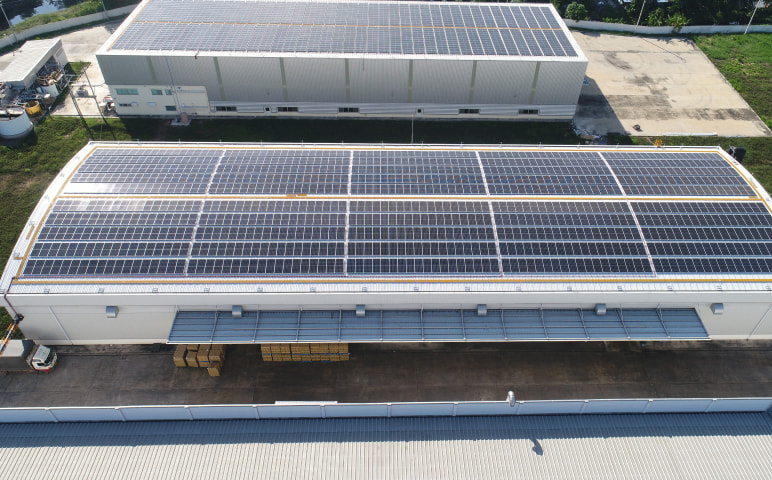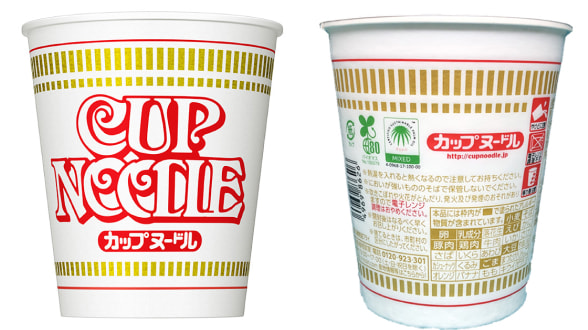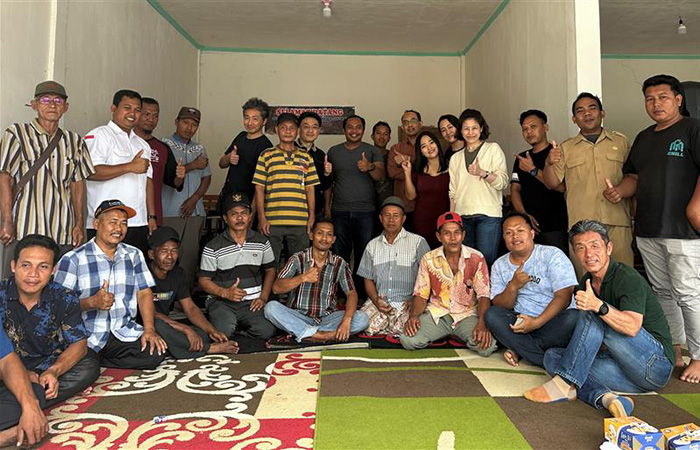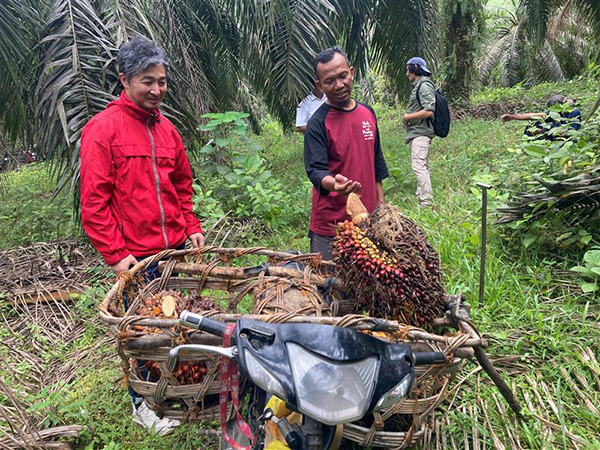Sustainability Management
Climate Change and Sustainable Procurement Initiatives
Index
The NISSIN FOODS group holds to the philosophy of being an EARTH FOOD CREATOR, contributing to society and the Earth by bringing joy and pleasure to people through food. The NISSIN FOODS Group has wide-ranging responsibilities and societal issues that must be addressed. These include constructing a food safety management system, reducing our environmental impact, and establishing governance.
Climate Change Initiatives
In order to achieve the CO2 reduction targets established in the “Earth Food Challenge 2030”
environmental strategy we launched in June 2020, the NISSIN FOODS Group is working on CO2
reduction initiatives throughout our value chain.
In November 2022, we pledged to take action to become Nature Positive, reversing the loss of biodiversity
and nature due to deforestation and other factors towards a positive recovery. Our goal is to achieve
carbon neutrality by 2050 through net-zero CO2 emissions.
Utilizing Renewable Energy
Since February 2021, NISSIN FOODS Group has participated in the RE100 international initiative, which aims to procure 100% of the electricity used in business activities from renewable energy sources. We set targets to procure 60% of the electricity used in domestic and international business activities through renewable energy sources by FY 3/2031 and 100% by 2050. We installed solar panels at our East Myojo Kobe plant and at Sagami Fresh in FY 3/2023. The ratio of renewable energy for the entire group in 2022 was 31.9%. In addition, the NISSIN FOODS HOLDINGS Tokyo Head Office uses waste-to-electricity, energy generated from the incineration of waste. Since the amount of electricity generated by waste-to-electricity fluctuates on a daily basis, the amount of electricity supplied to our company varies. However, we procure more than 50% of the electricity used at our Tokyo headquarters through this method.

Reducing CO2 Emissions Through Our Products
We use Biomass ECO Cups for CUP NOODLES brand containers. These cups partially replaced petrochemical-derived plastic with plant-derived biomass while maintaining the heat insulation and aroma retention properties of the conventional ECO Cups. Through the use of the cup, the amount of petrochemical-derived plastic used has nearly halved and CO2 emissions through LCA have been reduced by approximately 16%. In terms of CUP NOODLES ingredients, we are expanding our product lineup using Nazoniku (a flavored minced product combining plants and other ingredients with meat and soy-derived ingredients). Nazoniku contains more plant proteins (soy, etc.) with less CO2 emissions in the production process than animal proteins (pork, etc.). In addition, we are continuing to develop and commercialize cultured meat that does not rely on livestock through joint research with the Institute of Industrial Science, the University of Tokyo. Further, we did away with the plastic lid sticker on CUP NOODLES in June 2021, adopting a new double-tab lid shape that closes the cup without a sticker. This redesign alone is reducing the amount of plastic used by 33 tons per year.

Sustainable Procurement Initiatives
The NISSIN FOODS Group instituted the Basic Policy on Green Procurement in May 2007 and is promoting the procurement of environmentally friendly raw materials. To build a traceability system, we also instituted the NISSIN Group Policy on Sustainable Procurement in September 2017, which respects the global environment and human rights, and proclaims our commitment to procuring legally produced raw materials. As cooperation from our primary suppliers is important to achieve this sustainable procurement, we inform them of the details and obtain signed documents on the confirmation.
Among the raw materials in our products, palm oil (a vegetable oil extracted from oil palms) in particular is cited for deforestation, violations of human rights of plantation workers, and other issues in some plantations and palm oil mills. Our group is focusing efforts on the sustainable procurement of palm oil.
Sustainable Procurement Practices for Palm Oil
In the NISSIN FOODS Group's environmental strategy, EARTH FOOD CHALLENGE 2030, we set a goal to raise the procurement rate for palm oil that is assessed to be sustainable to 100% for the entire group by FY 3/2031. We are undertaking measures to achieve this goal as quickly as possible. In addition, we aim to raise the procurement rate for palm oil that is assessed to be sustainable to 100% for our instant noodle business in Japan by FY 3/2026.
Furthermore, we established guidelines in May 2022 for efforts to comply with our Commitment to the Procurement of Sustainable Palm Oil. These guidelines cover our NDPE policy*1 as well. We simultaneously released a list of palm oil mills that consolidates the names and locations (location data) of suppliers to improve their traceability. Going forward, we will aim to introduce a forest footprint*2 focused in areas at high-risk of deforestation and peatland destruction, as well as to expand the scope of traceability back to the oil palm plantations.
- NDPE = No Deforestation, No Peat, No Exploitation
- Total area of forests and peatlands affected by a company's supply chain or financial institution's investments and financing

Dialogue with Small-Scale Oil Palm Farmers
NISSIN FOODS Group strengthens the supply chain monitoring system by directly confirming the working environments and the existence of human rights infringement of producers (especially small-scale oil palm farmers) who may be prone to labor exploitation and have difficulty voicing their grievances due to their business positions. From January to March 2022, we conducted a survey and held online dialogues with 50 small-scale oil palm farmers assessed to be on our supply chain. This initiative, continued from the previous implementation (2020), was conducted with the support of Caux Round Table (CRT) Japan and SPKS*, a local union of small-scale oil palm farmers in Indonesia.
In FY 3/2023, we visited Indonesia for the first time to conduct face-to-face conversations on site. Our dialogue with approximately 20 small-scale farmers revealed no human rights violations, environmental degradation, or other issues requiring immediate action. However, we did hear many farmers express concern over rising fertilizer costs and the impact this is having on their operations. We also learned that farmers who do not own tractors or other forms of transport are forced to rely on intermediaries to deliver their palm oil, reducing their profits. Often, these sorts of economic sustainability challenges are difficult for small-scale farmers to resolve on their own and could lead to human rights and environmental issues in the future. We remain committed to using such dialogues and other methods to understand the environmental and societal conditions of small-scale farmers and will work with our suppliers to formulate and implement measures to improve economic sustainability.
About Serikat Petani Kelapa Sawit (SPKS)
This is a union of small-scale oil palm farmers established in Indonesia in 2006. It supports production
of oil palm with consideration for the sustainability of farmers. The union has a network of more than
8,000 small-scale farmers in seven regions across Indonesia. Some of its activities include data
collection and mapping of small-scale farmers, organization of farmers, training to improve productivity,
and supporting the acquisition of certification—such as ISPO and RSPO—by farmers.
| FY 3/2021 (online) | Survey respondents: 20 small-scale farmers Participants in dialogue: roughly 18 small-scale farmers and agricultural advisors |
|---|---|
| FY 3/2022 (online) | Survey respondents: 50 small-scale farmers Participants in dialogue: approximately 20 small-scale farmers and agricultural advisors |
| FY 3/2023 (in person) | Participants in dialogue: approximately 20 people, including small farmers
and local village officials (In addition to the above, we are also conducting dialogues with the intermediaries and mills (oil factories) in the small-scale farmers supply) |
Topics of Dialogue

Dialogue with small-scale palm oil farmers in Indonesia

